2013版初中英语全程复习方略课件(教材复习案)八年级下册 Units 3、4(人教版)(共47张PPT)
文档属性
| 名称 | 2013版初中英语全程复习方略课件(教材复习案)八年级下册 Units 3、4(人教版)(共47张PPT) |
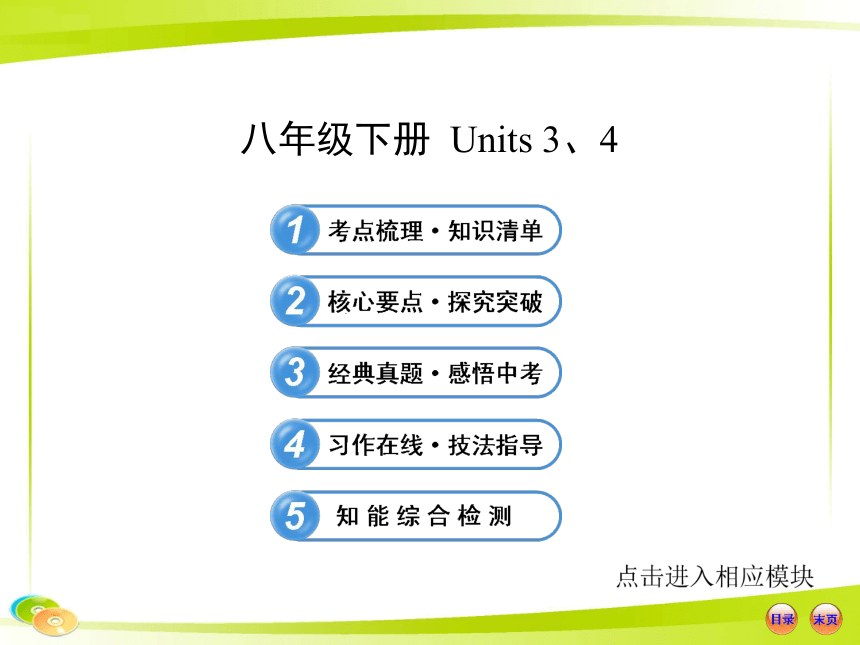
|
|
| 格式 | zip | ||
| 文件大小 | 1.1MB | ||
| 资源类型 | 教案 | ||
| 版本资源 | 人教新目标(Go for it)版 | ||
| 科目 | 英语 | ||
| 更新时间 | 2014-03-06 00:00:00 | ||
图片预览

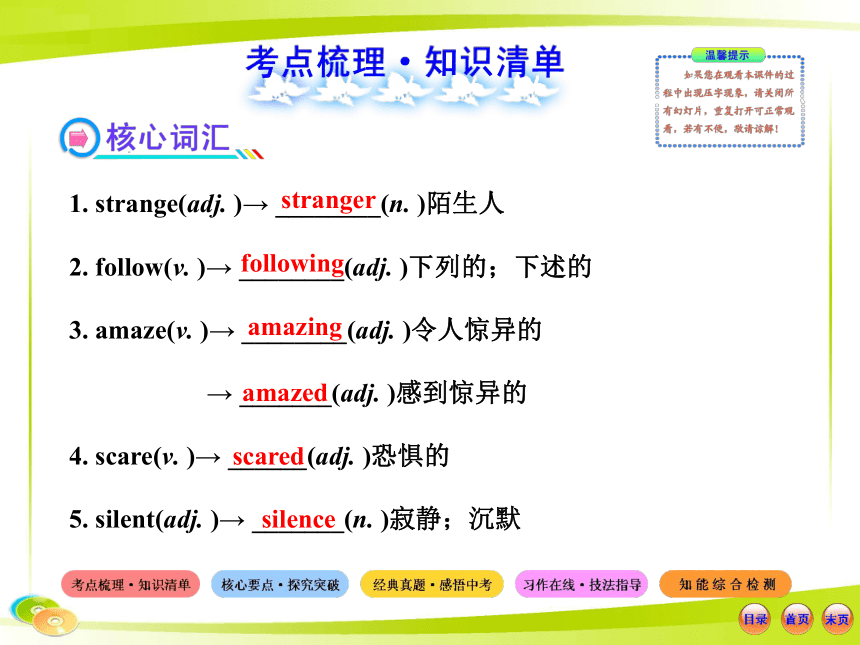
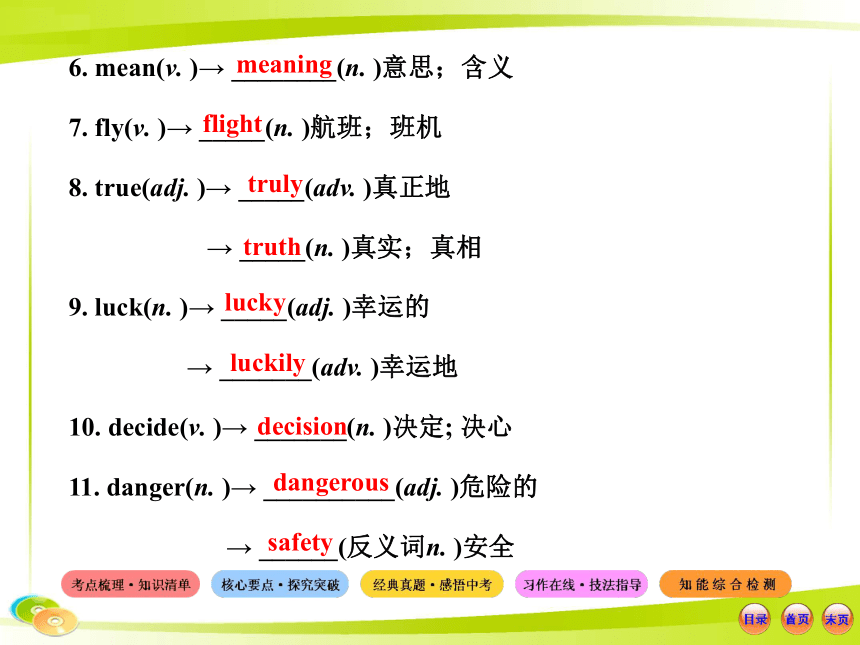
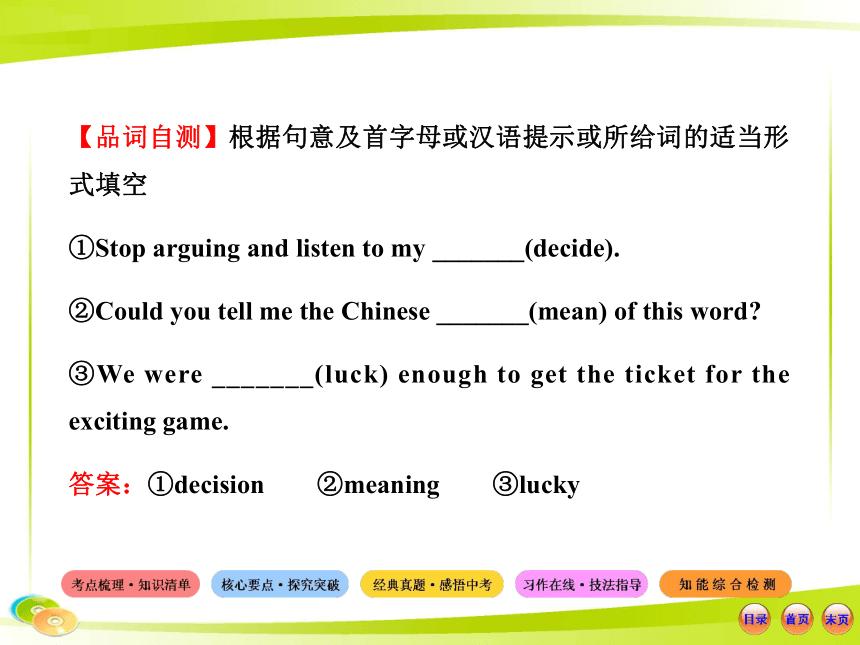
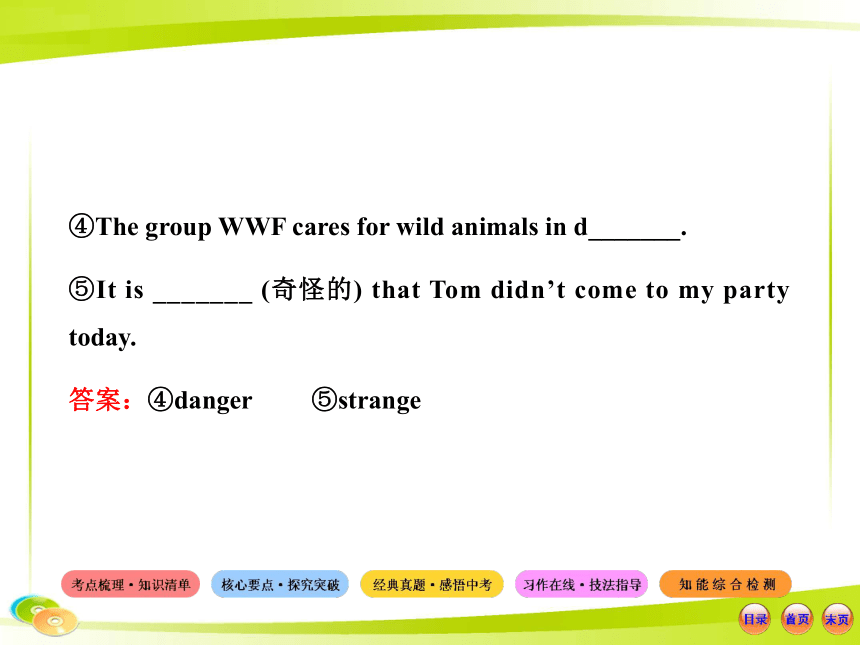
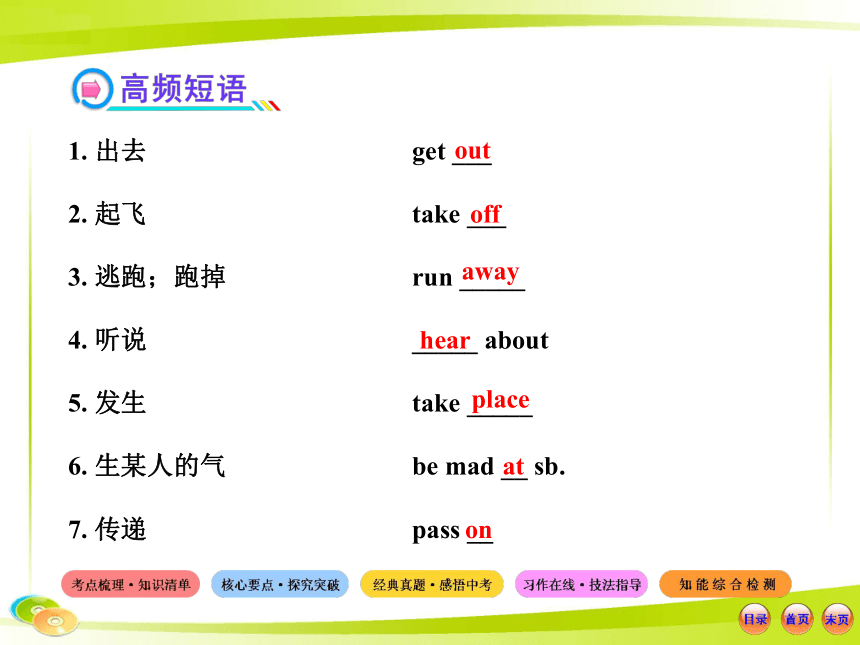
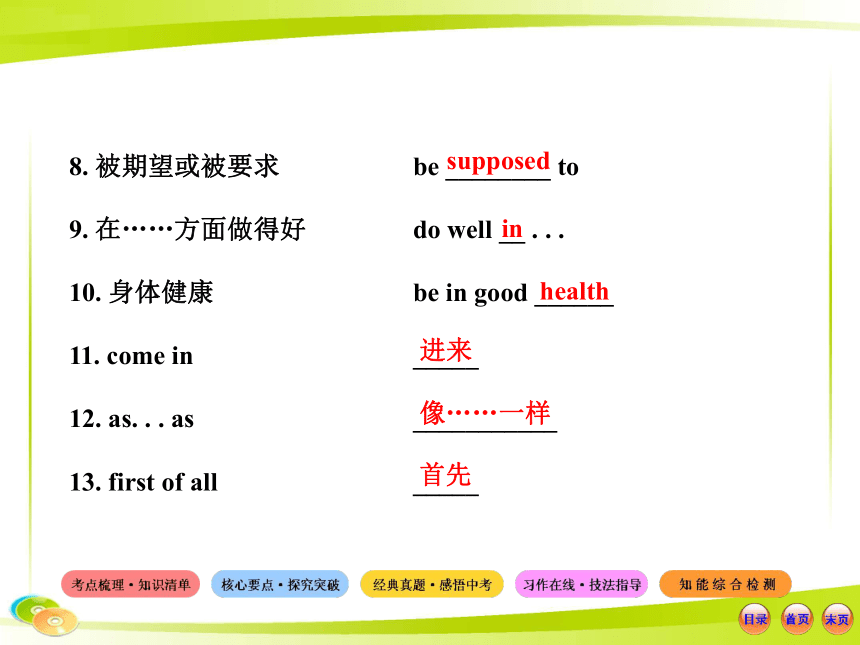
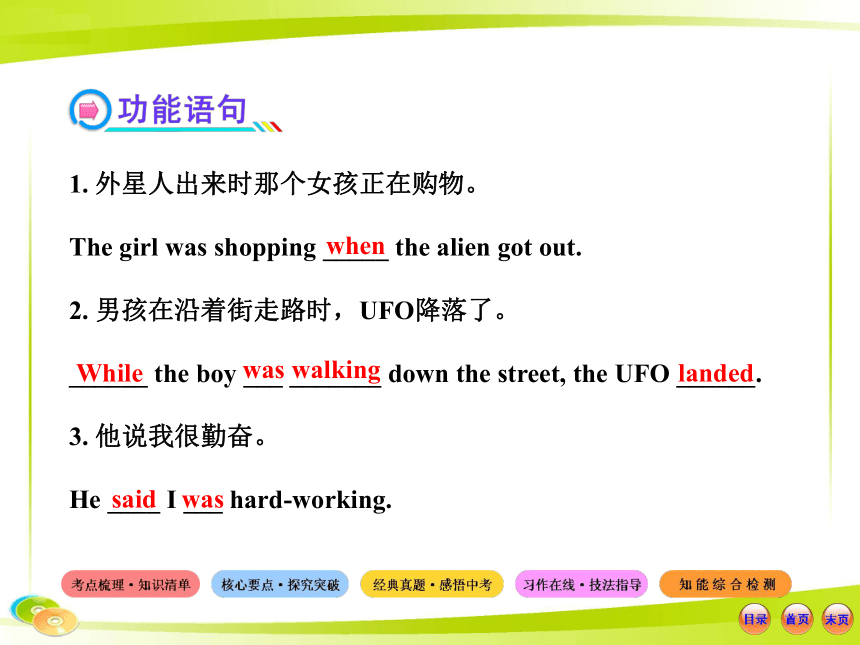
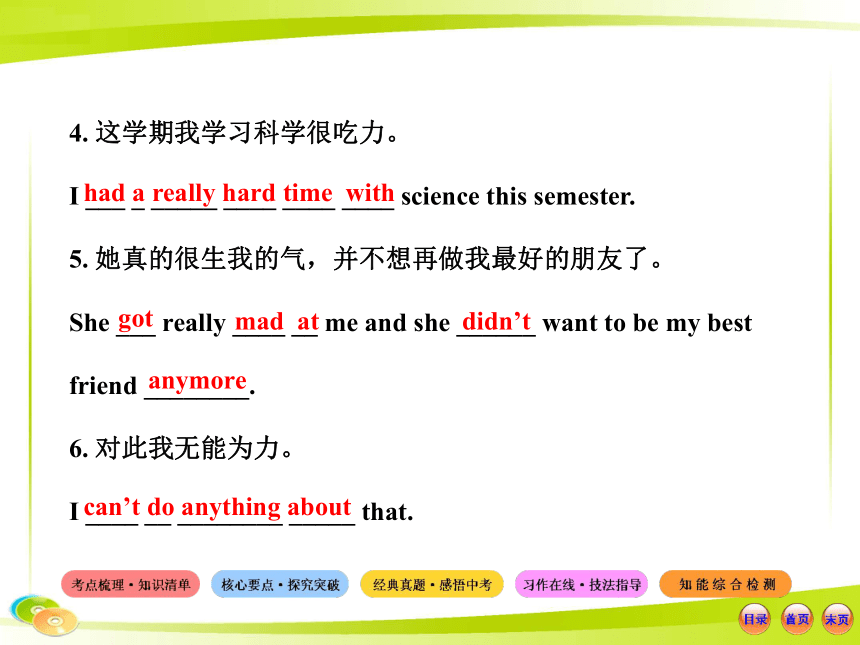

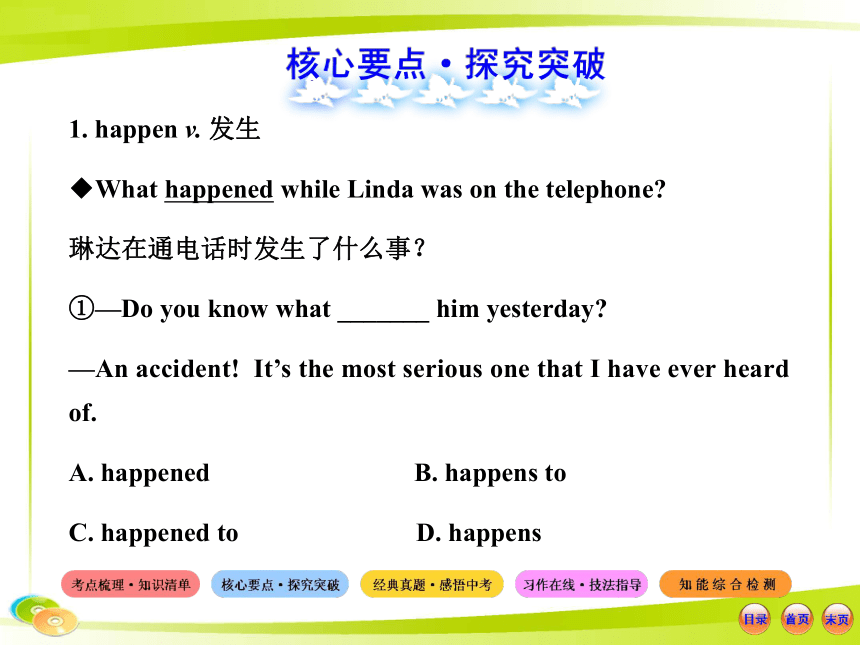
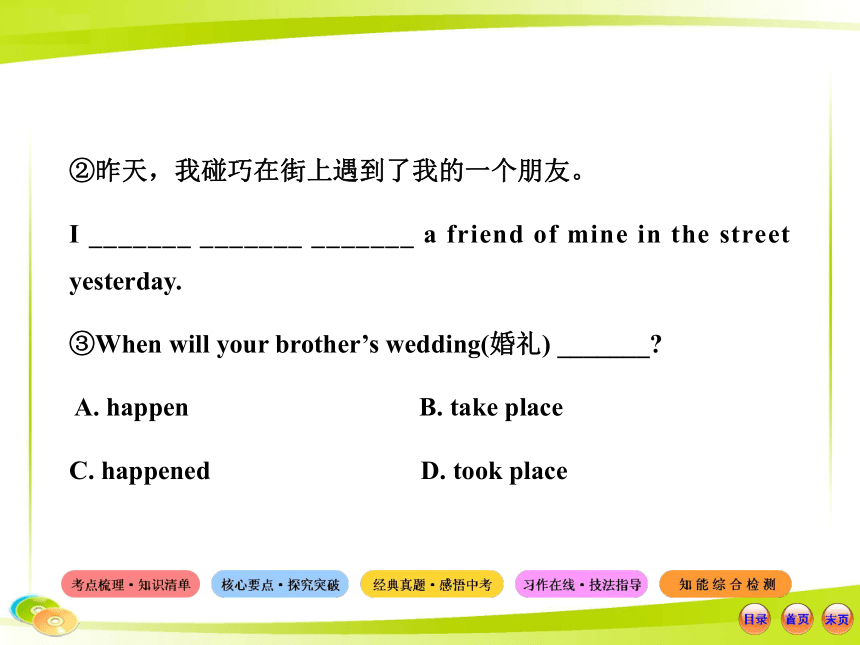
文档简介
(共47张PPT)
八年级下册 Units 3、4
1. strange(adj. )→ ________(n. )陌生人
2. follow(v. )→ ________(adj. )下列的;下述的
3. amaze(v. )→ ________(adj. )令人惊异的
→ _______(adj. )感到惊异的
4. scare(v. )→ ______(adj. )恐惧的
5. silent(adj. )→ _______(n. )寂静;沉默
stranger
following
amazing
amazed
scared
silence
6. mean(v. )→ ________(n. )意思;含义
7. fly(v. )→ _____(n. )航班;班机
8. true(adj. )→ _____(adv. )真正地
→ _____(n. )真实;真相
9. luck(n. )→ _____(adj. )幸运的
→ _______(adv. )幸运地
10. decide(v. )→ _______(n. )决定; 决心
11. danger(n. )→ __________(adj. )危险的
→ ______(反义词n. )安全
meaning
flight
truly
truth
lucky
luckily
decision
dangerous
safety
【品词自测】根据句意及首字母或汉语提示或所给词的适当形式填空
①Stop arguing and listen to my _______(decide).
②Could you tell me the Chinese _______(mean) of this word
③We were _______(luck) enough to get the ticket for the exciting game.
答案:①decision ②meaning ③lucky
④The group WWF cares for wild animals in d_______.
⑤It is _______ (奇怪的) that Tom didn’t come to my party today.
答案:④danger ⑤strange
1. 出去 get ___
2. 起飞 take ___
3. 逃跑;跑掉 run _____
4. 听说 _____ about
5. 发生 take _____
6. 生某人的气 be mad __ sb.
7. 传递 pass __
out
off
away
hear
place
at
on
8. 被期望或被要求 be ________ to
9. 在……方面做得好 do well __ . . .
10. 身体健康 be in good ______
11. come in _____
12. as. . . as ___________
13. first of all _____
supposed
in
health
进来
像……一样
首先
1. 外星人出来时那个女孩正在购物。
The girl was shopping _____ the alien got out.
2. 男孩在沿着街走路时,UFO降落了。
______ the boy ___ _______ down the street, the UFO ______.
3. 他说我很勤奋。
He ____ I ___ hard-working.
when
While
was walking
landed
said
was
4. 这学期我学习科学很吃力。
I ___ _ _____ ____ ____ ____ science this semester.
5. 她真的很生我的气,并不想再做我最好的朋友了。
She ___ really ____ __ me and she ______ want to be my best
friend ________.
6. 对此我无能为力。
I ____ __ ________ _____ that.
had a really hard time with
got
mad at
didn’t
anymore
can’t do anything about
过去进行时 【见P156】
1. happen v. 发生
◆What happened while Linda was on the telephone
琳达在通电话时发生了什么事?
①—Do you know what _______ him yesterday
—An accident! It’s the most serious one that I have ever heard of.
A. happened B. happens to
C. happened to D. happens
②昨天,我碰巧在街上遇到了我的一个朋友。
I _______ _______ _______ a friend of mine in the street yesterday.
③When will your brother’s wedding(婚礼) _______
A. happen B. take place
C. happened D. took place
【自主归纳】happen的用法
(1)sth. happen(to/with) sb. 某人发生了某事
(2)sb. happen to do sth. 某人碰巧做某事
(3)happen与take place的用法辨析:
①_______指偶然发生,具有不可预测性,主语一般是某人/ 某
事;
②take place指事先计划好或预先布置而发生,指某个确定事件。
答案:①C ②happened to meet ③B
happen
2. be supposed to 被期望或被要求
◆You are supposed to meet at the bus stop this morning to return it. 今天上午,你应该在车站见面后把它交还的。
①I think we are supposed to _______ hard and make progress every day.
A. work B. working C. works D. worked
②The students are supposed to wear school uniforms when they’re at school. (改为同义句)
The students _______ _______ school uniforms when they’re at school.
【自主归纳】be supposed to的用法
(1)be supposed to意为“被期望或被要求”,表示劝告、建议、义务等;
(2)be supposed to do相当于should do, 意为“认为/必须/应该做某事”;
(3)be supposed to do sth. 的否定形式为:be not supposed to do sth. 相当于shouldn’t do sth. ,意为“不应该/不能做某事”,表示命令和禁止。
【判断抢答】判断下面句子翻译正误
你不应该把这些书拿出阅览室。
①You are not supposed to taking the books out of the reading
room. ( )
②You are not supposed to take the books out of the reading
room. ( )
答案:①A ②should wear
×
√
3. The girl was shopping when the alien got out. 女孩在购物,就在这时外星人出来了(外星人出来时女孩正在购物)。
◆While the girl was shopping, the alien got out.
女孩正在购物时外星人出来了。
①(2011·哈尔滨中考)—I called you at 6 o’clock yesterday evening, but nobody answered.
—I’m sorry. I _______ my friend download the movie Kung Fu Panda Ⅱ when the telephone rang.
A. would help B. helped C. was helping
②He was still working on his project while other people _______ a rest.
A. were having B. are having
C. will have D. have
【自主归纳】when与 while的用法辨析
共同点 都可以引导时间状语从句,意为“当……的时候”
不
同
点
_____ 所引导从句中的动词既可以是延续性动词,也可以是非延续性(终止性)动词,从句中时态常用一般现在时或一般过去时
_____ 所引导从句中的谓语动词常用延续性动词,主从句动作若同时发生则主从句都用进行时态
when
while
答案:①C ②A
【判断抢答】判断下面句子翻译正误
当老师走进教室的时候,汤姆正在听收音机。
①Tom was listening to the radio while the teacher came into the
classroom. ( )
②Tom was listening to the radio when the teacher came into the
classroom. ( )
×
√
4. I had a really hard time with science this semester.
这学期我学习科学很吃力。
①I had a hard time in studying English. (改为同义句)
I had a hard time _______ _______.
②完成这项工作他们遇到了一些问题。
They had some problems _______ the work.
【自主归纳】have. . . time 构成句型的用法
(1)have a hard time with sth. 意为“做某事有困难”,其同义短
语为have a hard time(in)______ (do/ doing) sth.
(2)常见类似的句型还有:
a difficult time
difficulty
trouble
problems
答案:①with English ②finishing
doing
have with sth. /(in)doing sth.
Ⅰ. 词汇运用
1. (2012·烟台中考)Did you use to get _______(紧张的) when you see the school report from your teacher
2. (2012·兰州中考)You can not _______ (想象) how knowledgeable the person is.
3. (2012·宁波中考)John is _______ (幸运的)enough to be chosen for swimming club.
答案:1. nervous 2. imagine 3. lucky
4. (2012·滨州中考)My teacher told me that light _______ (travel) much faster than sound.
5. (2012·滨州中考)Mr. Green _______ (watch) TV at this time last night.
答案:4. travels 5. was watching
Ⅱ. 单项选择
1. (2012·上海中考)Jenny told me that she _______ an English Speech Contest the next month.
A. takes part in B. is taking part in
C. took part in D. would take part in
【解析】选D。由间接引语中“the next month”可知,应用过去将来时。
2. (2012·济南中考)—What were you doing at 7 yesterday evening, Jim
—I _______ about Harry Potter with my mom.
A. am talking B. talk
C. was talking D. talked
【解析】选C。句意:——吉姆,昨晚七点你在干什么?——我在和我妈妈谈论哈利·波特。根据问句,答语也用过去进行时。
3. (2011·梧州中考)I met a good friend of mine while I _______ on the street.
A. walks B. walk
C. was walking D. am walking
【解析】选C。while引导的从句,谓语动词用进行时,并且主句是一般过去时。故选C项。
4. (2011·资阳中考)Hurry up, Mike. You must get to the airport an hour before the plane _______.
A. gets off B. turns off
C. takes off D. puts off
【解析】选C。get off “下车”;turn off“关闭”;take off “起飞”;put off“推迟”。句意为“快点,迈克。 你必须在飞机起飞之前一个小时到达机场”。故选C。
5. (2011·黔西南州中考)Lucy does better in drawing than her twin sister.
A. is better for B. is better at
C. is better to D. is better in
【解析】选B。be good at相当于do well in。
6. (2011·佛山中考)Most of the sandstorm in our country _______ in spring from March to May.
A. happen B. happens C. is happening
【解析】选B。根据句意用一般现在时。
7. (2012·天津中考)—Can you tell me _______
—With Lucy’s help.
A. when you did it so well B. when did you do it so well
C. how you did it so well D. how did you do it so well
【解析】选C。宾语从句要用陈述语序。故排除B和D两项。由答语可知询问的是方式,故正确答案是C。
8. (2012·福州中考)—Steve, did you see the lantern show when you were in Fuzhou
—Of course! _______ beautiful lanterns!
A. What B. How C. What a
【解析】选A。考查感叹句的用法。此处感叹句的中心词是名词lanterns, 引导词应该用what, 并且由于lanterns是可数名词复数,因此不再用冠词a。故选A。
9. (2011·济南中考)—What were you doing _______ the UFO landed
—I was shopping with mother.
A. when B. how
C. which D. through
【解析】选A。由答语可知问句是时间状语从句,故用when当……时候。
10. (2011·北海中考)Tom is really upset about losing the game, but I think he will _______ it soon.
A. get on B. get over
C. get back D. get out
【解析】选B。句意:汤姆比赛失败后十分焦虑,但是我认为他很快就会克服的。get over克服。
【归纳总结】
get的词组小结
get back 回来;返回
get over 克服(困难等);从(疾病、失望、震惊等)
中恢复过来
get out 离去;(消息等)泄露
get along 过活;相处(with);进展
get into 进入
get off (从……)下来
get on 骑上(马、自行车等),登上(车、船、飞机等);
有进展
get rid of 处理掉;摆脱
get up 起床;起立
Ⅲ. 句型转换
1. (2012·济南中考)“Are you going to watch the football match next Sunday ”Father asked me. (改写句子,句意不变)
Father asked me _______ I _______ going to watch the football match next Sunday.
2. (2012·临沂中考)The teacher has told us how we should improve our speaking skills. (改为简单句)
The teacher has told us how _______ _______ our speaking skills.
答案:1. if; was 2. to improve
3. (2012·兰州中考)Was the machine invented by David She wasn’t sure. (合并成一句话)
She wasn’t sure _______ the machine was invented by David.
4. (2011·天水中考)I asked her, “Will you have a picnic tomorrow ”(改为间接引语)
I asked her _______ she _______ have a picnic the next day.
答案:3. if 4. if; would
5. (2011·江津中考)Maria asked me to go to her birthday party yesterday. (改为否定句)
Maria _______ _______ me to go to her birthday party yesterday.
答案:didn’t ask
讨论过去某一时刻发生的事情和转述他人的话语有机的结合是历年许多地市中考考查频率较高的话题之一。在写作此类话题作文的过程中要特别注意:1. 过去进行时和一般过去时的正确运用2. 转述他人话语时,人称和时态的变化。谈论感想、注意正确的思想倾向。
【典题示例】
一天放学回家时,你的父母还没到家。然后,你便玩起电脑游戏。当你玩的正高兴时,你的父母回家了。以下列问题为线索,写一篇80词左右的短文。要求符合逻辑,情节合理。
提示:1. When did you get home
2. What did you do first when you got home
3. What were you doing when your parents got home
4. What did your parents say to you
【审题谋篇】
1. 本文谈论过去某一个时刻发生的事情,应选用记叙文体。
2. 人称:主要使用第一人称,转述他人的话语时,注意人称和时态的变化。
3. 主要时态:谈论过去某一时刻发生的事情,主要用一般过去时和过去进行时,并且要准确运用连词when和while。
4. 高分模板:
【佳作诵读】
One day I got home at four, a little earlier than usual. As I didn’t want to do my homework at once, I turned on the computer and played computer games first. The game was so exciting that I forgot all about other things. When my parents came back home, I was playing the game. You see, I was only allowed to play computer games on weekends. Then, of course my parents got mad at me. They said they wouldn’t let me play computer games for one month. What a terrible day.
【名师点睛】
(1)文章准确地叙述了过去发生的事情,正确的运用了一般过去时及过去进行时又恰当地转述了他人的话语,整体结构严谨有序;
(2)文中运用了插入语you see,并且运用了first和then等表示时间先后顺序的词,使文章更连贯,过渡更自然,显示了作者丰富的词汇量和良好的写作水平。
(3)叙事语言简洁,把事件叙述得清晰明了,并且有一定的教育意义。
八年级下册 Units 3、4
1. strange(adj. )→ ________(n. )陌生人
2. follow(v. )→ ________(adj. )下列的;下述的
3. amaze(v. )→ ________(adj. )令人惊异的
→ _______(adj. )感到惊异的
4. scare(v. )→ ______(adj. )恐惧的
5. silent(adj. )→ _______(n. )寂静;沉默
stranger
following
amazing
amazed
scared
silence
6. mean(v. )→ ________(n. )意思;含义
7. fly(v. )→ _____(n. )航班;班机
8. true(adj. )→ _____(adv. )真正地
→ _____(n. )真实;真相
9. luck(n. )→ _____(adj. )幸运的
→ _______(adv. )幸运地
10. decide(v. )→ _______(n. )决定; 决心
11. danger(n. )→ __________(adj. )危险的
→ ______(反义词n. )安全
meaning
flight
truly
truth
lucky
luckily
decision
dangerous
safety
【品词自测】根据句意及首字母或汉语提示或所给词的适当形式填空
①Stop arguing and listen to my _______(decide).
②Could you tell me the Chinese _______(mean) of this word
③We were _______(luck) enough to get the ticket for the exciting game.
答案:①decision ②meaning ③lucky
④The group WWF cares for wild animals in d_______.
⑤It is _______ (奇怪的) that Tom didn’t come to my party today.
答案:④danger ⑤strange
1. 出去 get ___
2. 起飞 take ___
3. 逃跑;跑掉 run _____
4. 听说 _____ about
5. 发生 take _____
6. 生某人的气 be mad __ sb.
7. 传递 pass __
out
off
away
hear
place
at
on
8. 被期望或被要求 be ________ to
9. 在……方面做得好 do well __ . . .
10. 身体健康 be in good ______
11. come in _____
12. as. . . as ___________
13. first of all _____
supposed
in
health
进来
像……一样
首先
1. 外星人出来时那个女孩正在购物。
The girl was shopping _____ the alien got out.
2. 男孩在沿着街走路时,UFO降落了。
______ the boy ___ _______ down the street, the UFO ______.
3. 他说我很勤奋。
He ____ I ___ hard-working.
when
While
was walking
landed
said
was
4. 这学期我学习科学很吃力。
I ___ _ _____ ____ ____ ____ science this semester.
5. 她真的很生我的气,并不想再做我最好的朋友了。
She ___ really ____ __ me and she ______ want to be my best
friend ________.
6. 对此我无能为力。
I ____ __ ________ _____ that.
had a really hard time with
got
mad at
didn’t
anymore
can’t do anything about
过去进行时 【见P156】
1. happen v. 发生
◆What happened while Linda was on the telephone
琳达在通电话时发生了什么事?
①—Do you know what _______ him yesterday
—An accident! It’s the most serious one that I have ever heard of.
A. happened B. happens to
C. happened to D. happens
②昨天,我碰巧在街上遇到了我的一个朋友。
I _______ _______ _______ a friend of mine in the street yesterday.
③When will your brother’s wedding(婚礼) _______
A. happen B. take place
C. happened D. took place
【自主归纳】happen的用法
(1)sth. happen(to/with) sb. 某人发生了某事
(2)sb. happen to do sth. 某人碰巧做某事
(3)happen与take place的用法辨析:
①_______指偶然发生,具有不可预测性,主语一般是某人/ 某
事;
②take place指事先计划好或预先布置而发生,指某个确定事件。
答案:①C ②happened to meet ③B
happen
2. be supposed to 被期望或被要求
◆You are supposed to meet at the bus stop this morning to return it. 今天上午,你应该在车站见面后把它交还的。
①I think we are supposed to _______ hard and make progress every day.
A. work B. working C. works D. worked
②The students are supposed to wear school uniforms when they’re at school. (改为同义句)
The students _______ _______ school uniforms when they’re at school.
【自主归纳】be supposed to的用法
(1)be supposed to意为“被期望或被要求”,表示劝告、建议、义务等;
(2)be supposed to do相当于should do, 意为“认为/必须/应该做某事”;
(3)be supposed to do sth. 的否定形式为:be not supposed to do sth. 相当于shouldn’t do sth. ,意为“不应该/不能做某事”,表示命令和禁止。
【判断抢答】判断下面句子翻译正误
你不应该把这些书拿出阅览室。
①You are not supposed to taking the books out of the reading
room. ( )
②You are not supposed to take the books out of the reading
room. ( )
答案:①A ②should wear
×
√
3. The girl was shopping when the alien got out. 女孩在购物,就在这时外星人出来了(外星人出来时女孩正在购物)。
◆While the girl was shopping, the alien got out.
女孩正在购物时外星人出来了。
①(2011·哈尔滨中考)—I called you at 6 o’clock yesterday evening, but nobody answered.
—I’m sorry. I _______ my friend download the movie Kung Fu Panda Ⅱ when the telephone rang.
A. would help B. helped C. was helping
②He was still working on his project while other people _______ a rest.
A. were having B. are having
C. will have D. have
【自主归纳】when与 while的用法辨析
共同点 都可以引导时间状语从句,意为“当……的时候”
不
同
点
_____ 所引导从句中的动词既可以是延续性动词,也可以是非延续性(终止性)动词,从句中时态常用一般现在时或一般过去时
_____ 所引导从句中的谓语动词常用延续性动词,主从句动作若同时发生则主从句都用进行时态
when
while
答案:①C ②A
【判断抢答】判断下面句子翻译正误
当老师走进教室的时候,汤姆正在听收音机。
①Tom was listening to the radio while the teacher came into the
classroom. ( )
②Tom was listening to the radio when the teacher came into the
classroom. ( )
×
√
4. I had a really hard time with science this semester.
这学期我学习科学很吃力。
①I had a hard time in studying English. (改为同义句)
I had a hard time _______ _______.
②完成这项工作他们遇到了一些问题。
They had some problems _______ the work.
【自主归纳】have. . . time 构成句型的用法
(1)have a hard time with sth. 意为“做某事有困难”,其同义短
语为have a hard time(in)______ (do/ doing) sth.
(2)常见类似的句型还有:
a difficult time
difficulty
trouble
problems
答案:①with English ②finishing
doing
have with sth. /(in)doing sth.
Ⅰ. 词汇运用
1. (2012·烟台中考)Did you use to get _______(紧张的) when you see the school report from your teacher
2. (2012·兰州中考)You can not _______ (想象) how knowledgeable the person is.
3. (2012·宁波中考)John is _______ (幸运的)enough to be chosen for swimming club.
答案:1. nervous 2. imagine 3. lucky
4. (2012·滨州中考)My teacher told me that light _______ (travel) much faster than sound.
5. (2012·滨州中考)Mr. Green _______ (watch) TV at this time last night.
答案:4. travels 5. was watching
Ⅱ. 单项选择
1. (2012·上海中考)Jenny told me that she _______ an English Speech Contest the next month.
A. takes part in B. is taking part in
C. took part in D. would take part in
【解析】选D。由间接引语中“the next month”可知,应用过去将来时。
2. (2012·济南中考)—What were you doing at 7 yesterday evening, Jim
—I _______ about Harry Potter with my mom.
A. am talking B. talk
C. was talking D. talked
【解析】选C。句意:——吉姆,昨晚七点你在干什么?——我在和我妈妈谈论哈利·波特。根据问句,答语也用过去进行时。
3. (2011·梧州中考)I met a good friend of mine while I _______ on the street.
A. walks B. walk
C. was walking D. am walking
【解析】选C。while引导的从句,谓语动词用进行时,并且主句是一般过去时。故选C项。
4. (2011·资阳中考)Hurry up, Mike. You must get to the airport an hour before the plane _______.
A. gets off B. turns off
C. takes off D. puts off
【解析】选C。get off “下车”;turn off“关闭”;take off “起飞”;put off“推迟”。句意为“快点,迈克。 你必须在飞机起飞之前一个小时到达机场”。故选C。
5. (2011·黔西南州中考)Lucy does better in drawing than her twin sister.
A. is better for B. is better at
C. is better to D. is better in
【解析】选B。be good at相当于do well in。
6. (2011·佛山中考)Most of the sandstorm in our country _______ in spring from March to May.
A. happen B. happens C. is happening
【解析】选B。根据句意用一般现在时。
7. (2012·天津中考)—Can you tell me _______
—With Lucy’s help.
A. when you did it so well B. when did you do it so well
C. how you did it so well D. how did you do it so well
【解析】选C。宾语从句要用陈述语序。故排除B和D两项。由答语可知询问的是方式,故正确答案是C。
8. (2012·福州中考)—Steve, did you see the lantern show when you were in Fuzhou
—Of course! _______ beautiful lanterns!
A. What B. How C. What a
【解析】选A。考查感叹句的用法。此处感叹句的中心词是名词lanterns, 引导词应该用what, 并且由于lanterns是可数名词复数,因此不再用冠词a。故选A。
9. (2011·济南中考)—What were you doing _______ the UFO landed
—I was shopping with mother.
A. when B. how
C. which D. through
【解析】选A。由答语可知问句是时间状语从句,故用when当……时候。
10. (2011·北海中考)Tom is really upset about losing the game, but I think he will _______ it soon.
A. get on B. get over
C. get back D. get out
【解析】选B。句意:汤姆比赛失败后十分焦虑,但是我认为他很快就会克服的。get over克服。
【归纳总结】
get的词组小结
get back 回来;返回
get over 克服(困难等);从(疾病、失望、震惊等)
中恢复过来
get out 离去;(消息等)泄露
get along 过活;相处(with);进展
get into 进入
get off (从……)下来
get on 骑上(马、自行车等),登上(车、船、飞机等);
有进展
get rid of 处理掉;摆脱
get up 起床;起立
Ⅲ. 句型转换
1. (2012·济南中考)“Are you going to watch the football match next Sunday ”Father asked me. (改写句子,句意不变)
Father asked me _______ I _______ going to watch the football match next Sunday.
2. (2012·临沂中考)The teacher has told us how we should improve our speaking skills. (改为简单句)
The teacher has told us how _______ _______ our speaking skills.
答案:1. if; was 2. to improve
3. (2012·兰州中考)Was the machine invented by David She wasn’t sure. (合并成一句话)
She wasn’t sure _______ the machine was invented by David.
4. (2011·天水中考)I asked her, “Will you have a picnic tomorrow ”(改为间接引语)
I asked her _______ she _______ have a picnic the next day.
答案:3. if 4. if; would
5. (2011·江津中考)Maria asked me to go to her birthday party yesterday. (改为否定句)
Maria _______ _______ me to go to her birthday party yesterday.
答案:didn’t ask
讨论过去某一时刻发生的事情和转述他人的话语有机的结合是历年许多地市中考考查频率较高的话题之一。在写作此类话题作文的过程中要特别注意:1. 过去进行时和一般过去时的正确运用2. 转述他人话语时,人称和时态的变化。谈论感想、注意正确的思想倾向。
【典题示例】
一天放学回家时,你的父母还没到家。然后,你便玩起电脑游戏。当你玩的正高兴时,你的父母回家了。以下列问题为线索,写一篇80词左右的短文。要求符合逻辑,情节合理。
提示:1. When did you get home
2. What did you do first when you got home
3. What were you doing when your parents got home
4. What did your parents say to you
【审题谋篇】
1. 本文谈论过去某一个时刻发生的事情,应选用记叙文体。
2. 人称:主要使用第一人称,转述他人的话语时,注意人称和时态的变化。
3. 主要时态:谈论过去某一时刻发生的事情,主要用一般过去时和过去进行时,并且要准确运用连词when和while。
4. 高分模板:
【佳作诵读】
One day I got home at four, a little earlier than usual. As I didn’t want to do my homework at once, I turned on the computer and played computer games first. The game was so exciting that I forgot all about other things. When my parents came back home, I was playing the game. You see, I was only allowed to play computer games on weekends. Then, of course my parents got mad at me. They said they wouldn’t let me play computer games for one month. What a terrible day.
【名师点睛】
(1)文章准确地叙述了过去发生的事情,正确的运用了一般过去时及过去进行时又恰当地转述了他人的话语,整体结构严谨有序;
(2)文中运用了插入语you see,并且运用了first和then等表示时间先后顺序的词,使文章更连贯,过渡更自然,显示了作者丰富的词汇量和良好的写作水平。
(3)叙事语言简洁,把事件叙述得清晰明了,并且有一定的教育意义。
